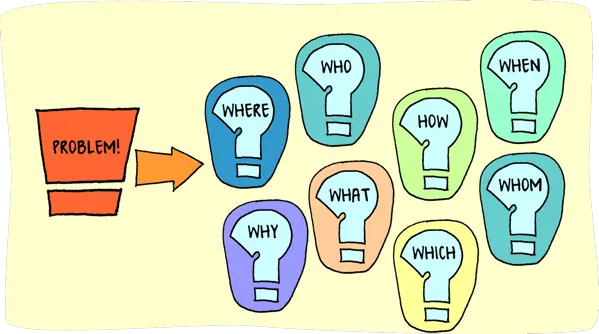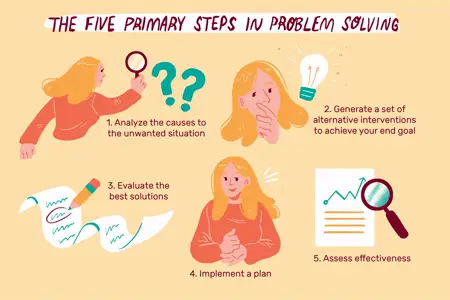The Importance of Problem-Solving Skills
Problem-solving skills are indispensable in both personal and professional life. They empower individuals to tackle challenges and complexities with effectiveness and creativity.
In this comprehensive article by Aniday, we'll delve into the significance of problem-solving skills, offering insights into their concepts, roles, and functions. Discover the art of problem-solving and equip yourself with an essential tool for success in various aspects of life and work.
The concept of problem-solving skills

Problem-solving skills refer to the ability to identify, analyze, and find solutions to problems you encounter in life and work. This skill involves various activities, including communication, research, decision-making, risk management, and creativity. Rather than relying solely on technical knowledge, this skill demands logical, flexible, and critical thinking.
The important role of problem-solving skills
Problem-solving skills play a pivotal role in your life and work because they:
- Enable you to solve problems quickly, effectively, and at the lowest cost.
- Foster the creation of creative, novel, and context-appropriate solutions.
- Enhance communication, collaboration, and leadership abilities within teams.
- Boost your confidence and reduce anxiety when facing challenges.
- Facilitate personal development, experiential learning, and knowledge cultivation.
Essential problem-solving skills
To excel in problem-solving skills, you need the following abilities:
- Communication and Active Listening: Articulate your ideas clearly and respectfully while actively and empathetic listening to others to facilitate problem understanding and solution agreement.
- Research: Master the use of reliable information sources, distinguish between accurate and inaccurate data, and synthesize and present information logically for informed problem analysis.
- Analysis: Employ analytical tools, methods, and techniques like Mind Maps, Brainstorming, SWOT, 5W1H, Fishbone, Pareto, etc., for comprehensive and detailed problem identification.
- Decision-Making: Learn to compare, evaluate, and select solutions based on criteria such as effectiveness, feasibility, cost, time, and risk, while also seeking input from relevant stakeholders and expressing opinions clearly.
- Risk Management: Develop skills to predict, prevent, and address adverse situations that may arise during problem-solving, identify, evaluate, and minimize risks, and prepare contingency plans and emergency responses.
- Creativity: Cultivate the ability to generate new, unique, and innovative ideas for addressing problems by employing imagination, association, and experimentation, without being constrained by conventional approaches.
Steps to take to resolve the problem

To systematically and methodically develop problem-solving skills, follow these steps:
Step 1: Identify the problem
This is the most crucial step in problem-solving. Use the 5W1H questions (What? When? Where? Who? Why? How?) to precisely and clearly define the problem.
Step 2: Understand the source of the problem
Determine the origin of the problem by identifying its causes, distinguishing between causes and consequences, and using techniques like the "5 Whys" method.
Step 3: Analyze and understand
Analyze the problem comprehensively, considering its severity, impact, priority, solvability, and other aspects. Collect relevant information, data, and opinions using tools like fishbone charts, SWOT matrices, and Eisenhower matrices.
Step 4: Find the most optimal solution
Generate possible solutions, fostering creativity and flexibility. Evaluate solutions based on criteria such as effectiveness, cost, time, and risk, using tools like Pareto charts and decision matrices.
Step 5: Solve the problem
Plan and execute the chosen solution by specifying goals, actions, responsible parties, required resources, and deadlines. Communicate and collaborate with stakeholders effectively. Utilize tools like Gantt charts, PERT charts, and RACI charts for planning and execution.
Step 6: Monitor the process and evaluate the results
Continuously monitor the problem-solving process, assess results against goals, anticipate new issues, and adjust or improve as necessary. Utilize tools such as the PDCA cycle, DMAIC cycle, and AAR cycle for process monitoring and result evaluation.
Tips to improve problem-solving skills

To enhance your problem-solving skills, practice regularly and apply proven, effective methods, tools, and experiences. Here are some helpful tips:
1. Use Mind Maps
Mind Maps are valuable thinking tools for organizing, classifying, and connecting ideas, information, and data related to problems in a structured manner.
2. Engage in Brainstorming
Brainstorming is a popular and effective creative method for problem-solving. It involves gathering ideas, opinions, and suggestions from various individuals or groups to uncover novel solutions.
3. Apply IDEAL
IDEAL stands for Identify, Define, Explore, Act, and Look. It's a systematic problem-solving process that helps you approach problems in a controlled manner, from identification to resolution.
4. Learn from Experienced Problem Solvers
Seek insights from individuals who have successfully solved similar or different problems. Understand their thought processes, methods, and best practices to improve your skills.
5. Continuous Knowledge Enhancement
Keep learning and expanding your knowledge. Stay updated on the latest trends, technologies, and changes in your environment. Explore various learning formats, including books, videos, courses, seminars, workshops, and knowledge-sharing groups.
Conclusion
In conclusion, problem-solving skills are indispensable assets that empower individuals to navigate life and work effectively. This article by Aniday has shed light on the significance of these skills, their essential components, and a systematic approach to honing them. By embracing a structured problem-solving process, leveraging creativity, and continuously seeking knowledge, you can cultivate these skills to tackle challenges with confidence and innovation.
Problem-solving skills not only help resolve specific issues but also foster personal growth, adaptability, and resilience. Start your journey towards becoming a proficient problem solver today and unlock a world of possibilities in both your personal and professional life.
Aniday's HR Services
Headhunting Service
Find and recruit quality candidates in just 1 week! Supported by 40,000 experienced headhunters in IT, Finance, Marketing… capable of recruiting in any region.
Headhunting Service ➔Employer of Record (EOR) Service
On behalf of your business, we recruit employees and handle payroll without the need to establish a company in markets such as Vietnam, Singapore, Malaysia, India, Indonesia…
Employer of Record (EOR) Service ➔